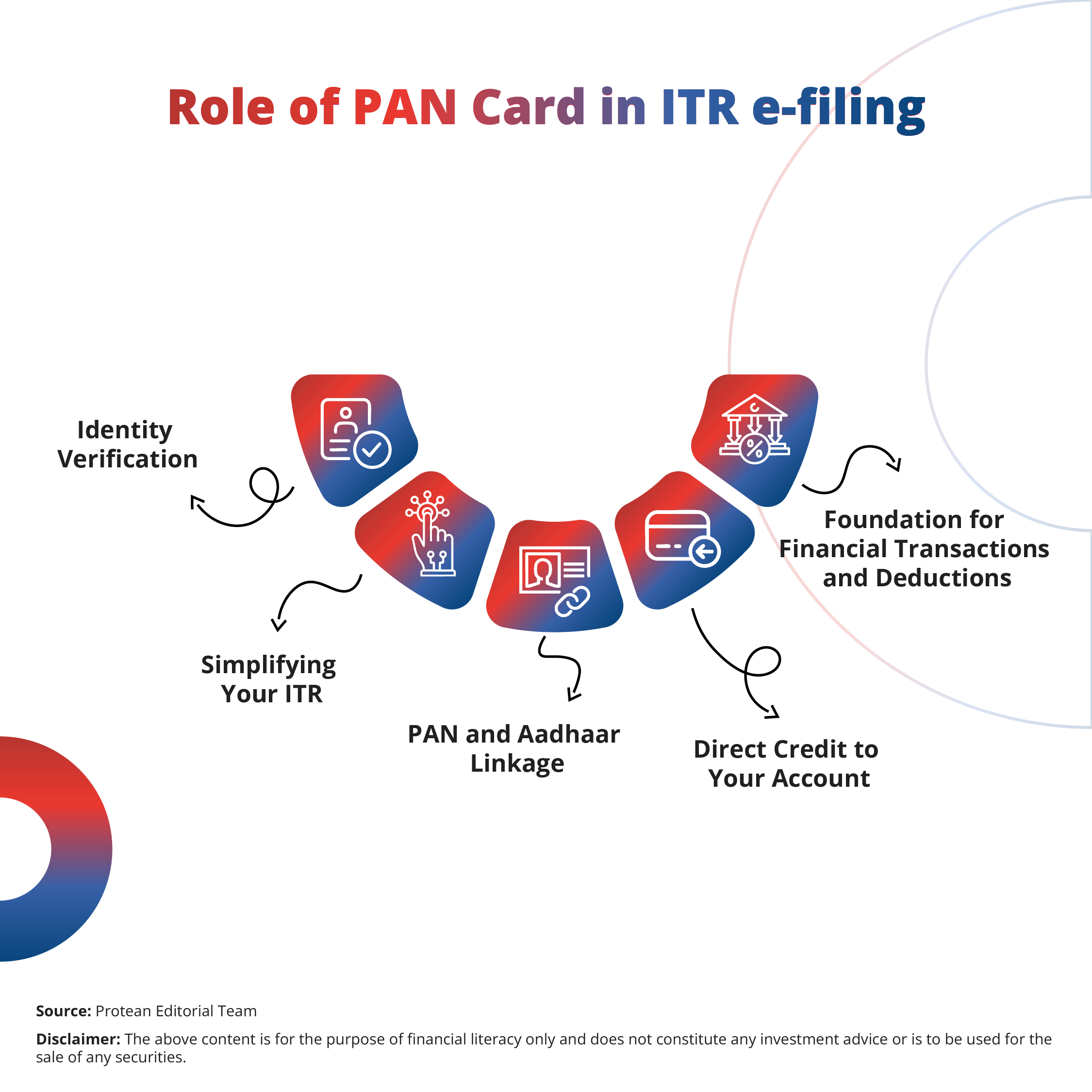When you think of financial responsibilities, which are the two words that cross your mind? The most common answer to this question in India can be, ‘PAN card’ and ‘Income Tax filing.’
Your Permanent Account Number, or PAN card utility extends far beyond being a mere identity card. It is in fact, the very foundation upon which the entire structure of your Income Tax Returns (ITR) is built.
Understanding the pivotal role of the PAN card in ITR e-filing is the first step towards seamless tax compliance. So, let us get started with learning about the mandatory PAN requirement for Indian taxpayers, consequences of no PAN and PAN application steps.
Why is PAN Card Mandatory for Income Tax Filing in India?
The mandatory PAN card requirement is a legal directive. Section 139A of the Income Tax Act, 1961, has explicitly outlined the requirement for individuals and entities to obtain and quote their PAN in various financial transactions and, most importantly, while filing their income tax returns.

Click here to view comprehensive information on PAN cards in India.
This mandatory PAN requirement can serve a dual purpose.
- Provides a unique and permanent identification number. This can prevent the kind of ambiguity that could arise from using names or addresses, which might change over time.
- Allows the Income Tax Department to create a comprehensive financial profile for each Indian taxpayer. Your PAN card is your tax identification number. Every significant financial event, from receiving a salary and making high-value purchases to investing in mutual funds, is linked to this single number. This intricate web of information can help cross-identify your ITR declared income against the data available with the Income Tax Department (ITD).
| Want to get a PAN number for yourself? Start the process of PAN application now! |
Role of PAN Card in ITR e-filing
The significance of a PAN card in the Income Tax Returns filing journey is multifaceted. Meaning, it can extend into every critical stage of the process. Its role is not passive; it actively facilitates a smoother and more accurate filing experience. Let us look at its main roles below:
1. Identity Verification
- To begin the process of Income Tax filing online, you need to first register on the official e-filing portal of the ITD.
- Your PAN number is your permanent user ID for this portal. This initial step of identity verification is crucial for security and ensures that only the authorised individual can access and file their income tax returns. Without a valid PAN number, access to this essential platform is denied.
2. Simplifying Your ITR
An advantage of the PAN system is its ability to enable the pre-filling of your ITR form. Your PAN card is linked to your bank accounts, your employer, and other financial institutions. Therefore, the ITD can automatically populate parts of your return with relevant information. This can include your following details:
- Salary income,
- Interest earned from savings accounts & fixed deposits,
- Tax Deducted at Source (TDS) or Tax Collected at Source (TCS).
This feature can save a substantial amount of time in Income Tax filing. It can also significantly reduce the chances of errors that can occur during manual data entry, leading to a more accurate ITR tax compliance.
3. PAN and Aadhaar Linkage
The mandatory PAN and Aadhaar card linking is a critical prerequisite for filing your income tax returns. An unlinked PAN is considered 'inoperative,' which brings a host of complications. An ITR filed with an inoperative PAN may not be processed, and you could face penalties. Thus the tax authorities have aimed to eliminate duplicate PANs and further strengthen the verification and a comprehensive audit trail of financial transactions.
4. Direct Credit to Your Account
If you are due a tax refund after filing your Income Tax filing, your PAN card can be vital in ensuring that you receive it promptly.
For ITD to credit the refund amount directly to your bank account, your PAN card needs to be linked to that specific account. Also, the account must be pre-validated on the e-filing portal. This seamless electronic process has replaced the earlier system of issuing paper cheques, making the refund process faster and more secure.
5. Foundation for Financial Transactions and Deductions
Your PAN card is indispensable for a wide array of financial transactions. The mandatory PAN requirements is there for:
- Opening a new bank account
- Purchasing mutual funds
- Buying or selling property exceeding a certain value, and more.
These transactions are reported to the tax authorities by the respective financial institutions under the Statement of Financial Transactions (SFT). It is then used to validate the income and investments you declare in your income tax returns. Furthermore, to claim various deductions and exemptions under the IT Act, such as those for investments under Section 80C, your PAN card is essential.
| To learn about the role of PAN card in the tax filing ecosystem click here. |
Consequences of No PAN or Incorrect PAN Card Usage
If you fail to manage your PAN card correctly, you might have to face various financial and legal issues.
The following are some of the major consequences:
- Blocks ITR Filing: You cannot file your income tax returns without a PAN card. Your PAN number is your primary login ID for the tax portal, leading to non-filing penalties.
- Higher TDS Deduction: Not providing your PAN results in a higher Tax Deducted at Source (TDS), typically 20%, which reduces your immediate income until you file an ITR to claim a refund.
- Restricts Financial Transactions: Major financial activities like opening bank accounts, investing in mutual funds, or buying property, all have a mandatory PAN requirement.
- Legal Penalties: Providing an incorrect PAN might lead to a financial penalty under Section 272B of the IT Act.
- 'Inoperative' PAN Complications: If your PAN is not linked to your Aadhaar, it can become inoperative. This would halt ITR processing, freeze tax refunds, and trigger higher TDS rates.
Conclusion
The PAN card is indeed far more than a simple identification document, it’s your tax identification number. It is the central pillar that supports the entire framework of Income Tax filing. It is your tool for simplifying the filing of income tax returns, and a prerequisite for a multitude of financial transactions.
- Having a valid PAN card
- Linking it with your Aadhaar
- Quoting it correctly in all relevant financial dealings
These three steps are fundamental towards responsible financial citizenship. A proactive approach to managing your PAN details can ensure a hassle-free ITR filing experience. It could also safeguard you from potential penalties and legal complications. Ultimately, viewing your PAN card as a gateway to seamless tax compliance is crucial for Indian taxpayers.
| Start your PAN card application now! |

